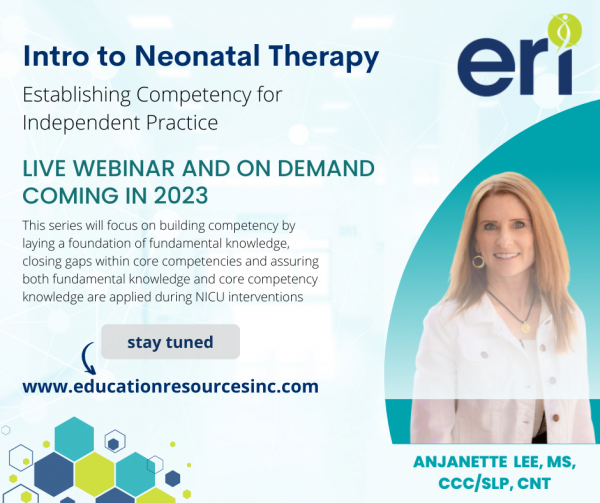
Authored by Anjanette Lee CCC/SLP, CNT
Neonatal Therapists (NTs) have long struggled to find or create competencies that reflect the specialty knowledge and skills needed to provide independent and safe practice with the fragile NICU population. This past spring, the National Association of Neonatal Therapists (NANT) released “Practice Competencies for the Neonatal Therapist”.
This interprofessional set of competencies, developed by the NANT Professional Collaborative, sets the bar for therapists working in the advanced practice setting of the NICU.
Why have interprofessional competencies?
Skilled neonatal therapy competencies are necessary for NTs to provide independent and safe interventions from birth to enhance physiologic function and neurostructural development of preterm and medically fragile neonates.
The disciplines of Occupational Therapy, Physical Therapy and Speech-Language Pathology all share a need for competency in applying certain common knowledge, skills and interventions within the NICU. This common ground has been outlined in NANT’s “Core Scope of Practice” document, which is currently under revision.
What experience levels are the NANT Practice Competencies designed for?
The NANT Practice Competencies were developed for all experience levels of NTs.
These dynamic set of competencies may be used by NTs providing services in any level of NICU (II -IV) and are designed to guide NTs at all stages of competency development – those beginning to build competency, those working to master basic competency for independent practice, and those working towards advanced competency. Advanced level competency in all areas may be the ultimate goal for some, but this may vary by profession, longevity, and practice environment.
How are the NANT Practice Competencies organized?
Will they adapt to my organization’s competency format?
The NANT Practice Competencies are divided into 3 sections – Fundamental Knowledge, Core Competencies, & Interventions. Each section is prefaced with recommendations and directions for intended use.
Fundamental Knowledge includes sections addressing the theoretical foundations for practice, medical history, equipment, professional ethics, assessment tools, environment, and body systems.
address the environment, family, sensory system, neurobehavior, neuromotor & musculoskeletal, and oral feeding & swallowing.
Finally, Interventions include environmental management, swaddled bathing, diapering, swaddling, dressing, positioning, skin-to-skin holding, non-pharmacologic pain & stress management, facilitating movement patterns, facilitating sensory exposures, lactation support, oral care/oral immune therapy (OIT), non-nutritive sucking, therapeutic tastes, preparation for breast & bottle feeding, breastfeeding, and bottle feeding.
In addition to these sections, there is a five-page Competency Summary Report that consolidates the 3 sections and allows for more concise departmental documentation of competency. This report can be used as is, or its components can easily be adapted to meet an organization’s needs for documentation.
Where do I begin?
The first step is to get a copy of the NANT Practice Competencies! Next, dive in and see where you stand. Are there areas of Fundamental Knowledge that need addressing? Are there knowledge gaps in certain sections of the Core Competencies, or components in which you may be practicing at differing competency levels? Are there interventions utilized at your facility in which you have not yet demonstrated full competency?
Each NT is unique and thus the competency journey will be also. A mentored journey is highly recommended. If you don’t have an immediate option for a mentor, the NANT Ignite program is an excellent way to receive mentoring and education. NANT Ignite is a 10-month mentored program that is self-paced and on demand. It includes live monthly guidance calls with program mentors so that questions can be thoroughly addressed and ideas can be shared. It also includes a private Facebook group to allow connection and networking.
 For those that would like education regarding the areas covered by the Practice Competencies, a new ERI course series will begin in 2023. Intro to Neonatal Therapy – Establishing Competency for Independent Practice will focus on building competency by laying a foundation of fundamental knowledge, closing gaps within core competencies and assuring both fundamental knowledge and core competency knowledge are applied during NICU interventions. This new series will be available via live webinar and on demand.
For those that would like education regarding the areas covered by the Practice Competencies, a new ERI course series will begin in 2023. Intro to Neonatal Therapy – Establishing Competency for Independent Practice will focus on building competency by laying a foundation of fundamental knowledge, closing gaps within core competencies and assuring both fundamental knowledge and core competency knowledge are applied during NICU interventions. This new series will be available via live webinar and on demand.
This series will be perfect for both NTs working to establish competency and those studying for the Neonatal Therapy Certification exam.
Stay tuned for more information about this new series!
Anjanette Lee has over 25 years’ experience in the NICU, receiving NIDCAP certification in 1999 and then helping her NICU’s quality improvement team incorporate family centered, neuroprotective, and neuropromotive care practices as standards of care. As an imbedded NICU therapist, she is passionate about sharing knowledge with and utilizing all members of the neonate’s care team to support best neurodevelopmental outcomes. As a result, Anjanette provides ongoing education and mentorship for other Neonatal Therapists and NICU staff both within her hospital system and across the nation. Anjanette is certified in Neonatal Touch & Massage and was one of the first Certified Neonatal Therapists in the nation. She has co-authored chapters in Kenner & McGrath’s 1st edition of Developmental Care of Newborns & Infants, and Case-Smith & O’Brien’s 7th edition of Occupational Therapy for Children.
She serves as co-leader of the National Association of Neonatal Therapists Professional Collaborative and has co-authored NANT’s Neonatal Therapy Core Scope of Practice and Practice Competencies for the Neonatal Therapist. Anjanette also serves on the NANT national conference planning committee and is part of the teaching faculty for the NANT Ignite program.
